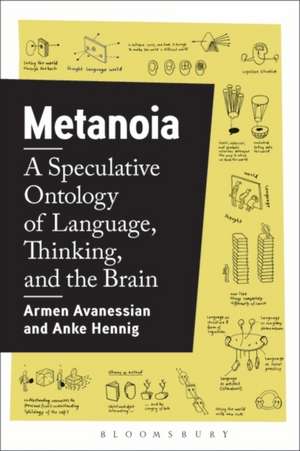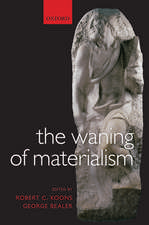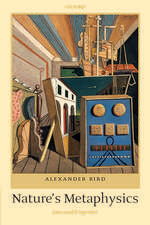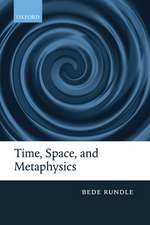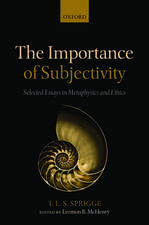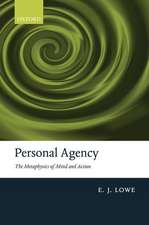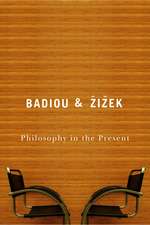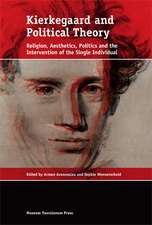Metanoia: A Speculative Ontology of Language, Thinking, and the Brain
Autor Armen Avanessian, Dr. Anke Hennig Introducere de Levi R. Bryanten Limba Engleză Hardback – 15 noi 2017
| Toate formatele și edițiile | Preț | Express |
|---|---|---|
| Paperback (1) | 165.56 lei 6-8 săpt. | |
| Bloomsbury Publishing – 7 aug 2019 | 165.56 lei 6-8 săpt. | |
| Hardback (1) | 714.92 lei 6-8 săpt. | |
| Bloomsbury Publishing – 15 noi 2017 | 714.92 lei 6-8 săpt. |
Preț: 714.92 lei
Preț vechi: 1027.91 lei
-30% Nou
Puncte Express: 1072
Preț estimativ în valută:
136.80€ • 146.29$ • 114.06£
136.80€ • 146.29$ • 114.06£
Carte tipărită la comandă
Livrare economică 18 aprilie-02 mai
Preluare comenzi: 021 569.72.76
Specificații
ISBN-13: 9781350004726
ISBN-10: 1350004723
Pagini: 232
Dimensiuni: 156 x 234 x 22 mm
Greutate: 0.5 kg
Editura: Bloomsbury Publishing
Colecția Bloomsbury Academic
Locul publicării:London, United Kingdom
ISBN-10: 1350004723
Pagini: 232
Dimensiuni: 156 x 234 x 22 mm
Greutate: 0.5 kg
Editura: Bloomsbury Publishing
Colecția Bloomsbury Academic
Locul publicării:London, United Kingdom
Caracteristici
One of the first contributions to a decisive shift within contemporary philosophy, overcoming the either/or of the linguistic and speculative turns
Notă biografică
Armen Avanessian is Visiting Faculty in the MA Aesthetics and Politics program in the School of Critical Studies at the California Institute of the Arts, USA, and Visiting Lecturer at the Art Institute, FHN Academy Basel, Switzerland. In 2012 he founded a bilingual research platform on Speculative Poetics, including a series of events, translations and publications: www.spekulative-poetik.de. He also is the co-editor of Genealogies of Speculation (Bloomsbury 2016).Anke Hennig teaches at the Freie Universität Berlin, Germany, in the Peter Szondi Institute of Comparative Literature and is a Research Fellow in the Collaborative Research Centre 626 'Aesthetic Experience and the Dissolution of Artistic Limits'. Her research interests lie in poetics and the philosophy of literature, Russian Formalism, the avant-garde, and totalitarian aesthetics.
Cuprins
Introduction by Levi Bryant I Poetics Principles of Ligual Poiesis The Poetic Function of Language (Jakobson) The Potentializing Function of Language (Guillaume) Poietic Linguistics The Myth of the Arbitrariness of the Sign Speculative Poetics II The Analytic Circle The Ligual Creation of a True World Triadic Logic of the Sign (Pierce) The Poetic Triad The Linguistic Turn, or: the Signified as Predicate of the Signifier S means X by Y (Kripke, Meillassoux, Harman) Lingual Things and the Ontology of Individuals (Strawson) III Speculation Aspects of a Poetics of Thought The Speculative Triad Subject - Object - Other: our Methodical Constellation Abduction as a Poietic Procedure Poeticizing Philosophy IV Cognition Metanoia is an Anagram of Anatomie173 The Recursive Structure of Cognition (Metzinger and Malabou) The Coevolution of Language and the Brain Aspects of Universal Grammar (Chomsky v. Leiss): Generative, Extra-linguistic, Cognitive Semiotics of the Brain (Deacon) Epilogue The Whole Truth and Nothing But the Truth! Matters Ethical (and Religious) Going Beyond Thought: Temporality Glossary Notes Index
Recenzii
How does reading texts actually alter our minds? This simple but important question is at the core of Metanoia. Armen Avanessian and Anke Hennig's intricately argued intervention updates literary philosophy for the 21st century. Synthesizing linguistics, poetics and cutting-edge neurophilosophy, Metanoia powerfully vindicates the claim that literature can transform our consciousness.
'In the concept of metanoia Avanessian and Hennig discern a phenomenon that is far more pervasive than the religious register and its conversions, but that lies at the core of thought and language. There is a power of language, thought, and speech to transform both the subject and the world. How is it, Avanessian and Hennig wonder, that a book, a poem, a conversation, or a line of thinking can fundamentally transform both the subject and the world?'
'In the concept of metanoia Avanessian and Hennig discern a phenomenon that is far more pervasive than the religious register and its conversions, but that lies at the core of thought and language. There is a power of language, thought, and speech to transform both the subject and the world. How is it, Avanessian and Hennig wonder, that a book, a poem, a conversation, or a line of thinking can fundamentally transform both the subject and the world?'
